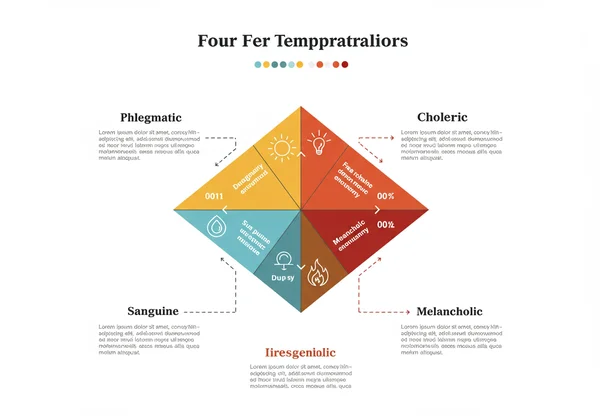Phlegmatic Temperament: The Ultimate Guide to the Calm Peacemaker
August 17, 2025 | By Arthur Bowman
Are you the calm, steady, and easygoing presence in your circle? If so, you might have a Phlegmatic temperament, one of the foundational four temperaments. Understanding the core phlegmatic traits is the first step toward profound self-awareness. This guide answers the question, 'What is a phlegmatic?' and helps you explore your unique strengths, navigate potential challenges, and thrive. In a world that often rewards noise and speed, the quiet strength of the Phlegmatic is a true superpower.
Ready to discover your innate temperament? Take our free, scientifically-validated Temperament Test to begin your journey.
What Is the Phlegmatic Temperament?
The Phlegmatic temperament is one of the four original types identified by ancient Greek philosophers and later adapted by modern psychology. This temperament is characterized by a calm, stable, and peaceful disposition. While other temperaments might be driven by ambition (Choleric) or social connection (Sanguine), the Phlegmatic is motivated by the desire for tranquility and stability.
They are the anchors in a storm, the steady presence that brings a sense of calm to any group. They observe more than they speak, think before they act, and prefer a life of quiet contentment over one filled with drama and disruption. This innate desire for peace shapes their entire approach to life, work, and relationships.
The Peacemaker Archetype
At their core, individuals with a Phlegmatic temperament embody the peacemaker archetype. They are natural mediators who instinctively seek to smooth over conflicts and find common ground. Their ability to remain objective and unemotional in tense situations allows them to see all sides of an issue, making them invaluable in negotiations, family disputes, or team disagreements.
This peacemaking tendency isn't a sign of weakness; it's a strategic choice. Phlegmatics understand that conflict expends precious energy and disrupts the harmony they crave. Therefore, they excel at building bridges, fostering cooperation, and creating environments where everyone feels heard and respected.

Core Motivations: Peace and Stability
The two guiding stars for the Phlegmatic are peace and stability. Everything they do is aimed at maintaining a predictable, low-stress environment. They are not fans of sudden changes, unexpected surprises, or high-pressure situations. They thrive on routine and feel most comfortable when they know what to expect.
This drive for harmony means they will often go to great lengths to avoid confrontation. They prefer to accommodate others rather than assert their own needs if it means keeping the peace. Understanding this core motivation is key to appreciating why a Phlegmatic person acts the way they do—it's all in service of creating a calm and balanced world around them. For a deeper analysis, an online temperament test can provide personalized insights.
Key Phlegmatic Traits: Strengths and Weaknesses
While every individual is unique, those with a Phlegmatic temperament tend to share a cluster of recognizable traits. These characteristics manifest as both incredible strengths and potential areas for personal growth. Understanding these traits is essential for self-improvement and for appreciating the Phlegmatics in your life.
Phlegmatic Strengths
The Phlegmatic temperament comes with a set of powerful and often underrated strengths that make them reliable friends, stable colleagues, and supportive partners.
-
Reliable and Consistent: You can count on a Phlegmatic. They are dependable, steady, and follow through on their commitments. They are not prone to mood swings, making them a consistent and trustworthy presence.
-
Patient and Tolerant: Their calm nature gives them an incredible well of patience. They can handle delays, difficult people, and tedious tasks without becoming easily frustrated. They are tolerant of others' flaws and are generally easygoing.
-
Diplomatic and Objective: As natural peacemakers, they excel at seeing situations from a neutral viewpoint. They don't let emotions cloud their judgment, allowing them to offer fair and balanced opinions.
-
Calm Under Pressure: While others panic, the Phlegmatic remains collected. Their low-key emotional state allows them to think clearly and act rationally in a crisis, making them a stabilizing force.
-
A Great Listener: Phlegmatics are attentive and empathetic listeners. They genuinely care about what others have to say and provide a supportive, non-judgmental ear, making people feel comfortable opening up to them.

Phlegmatic Weaknesses (and How to Improve)
No temperament is without its challenges. For the Phlegmatic, their greatest strengths can sometimes lead to certain difficulties. Recognizing these isn't about criticism, but about identifying opportunities for growth.
- Overcoming Procrastination: Their low-energy nature can lead to putting off tasks. Growth Tip: Use external deadlines and break large projects into small, manageable steps to build momentum.
- Improving Decisiveness: Fearing they might create conflict, they can struggle with decisions. Growth Tip: Practice making small, low-stakes decisions quickly to build confidence for larger ones.
- Embracing Change: Since they crave stability, new situations can be unsettling. Growth Tip: Frame change as an opportunity for a new, improved routine rather than a disruption.
- Expressing Needs Clearly: Often, both the phlegmatic woman and phlegmatic man internalize feelings to keep the peace. Growth Tip: Use "I feel" statements to express needs gently without creating conflict. Discover your type to better understand these patterns.
The Phlegmatic Temperament in Daily Life
Understanding the phlegmatic personality in life and work is about application. How do these innate traits translate into real-world behavior, career choices, and relationships? Knowing this can help Phlegmatics lean into their strengths and navigate their challenges more effectively.
Best Phlegmatic Careers
The ideal work environment for a Phlegmatic is structured, stable, and low in conflict. They flourish in roles where their patience, reliability, and diplomatic skills can shine. High-pressure, commission-based, or constantly changing jobs are often a poor fit.
Excellent career paths include:
-
Counseling and Social Work: Their empathy and listening skills make them natural healers and supporters.
-
Administration and Human Resources: They excel at creating orderly systems and handling sensitive interpersonal issues with grace.
-
Teaching and Librarianship: These roles require immense patience and a steady hand, which are hallmark Phlegmatic traits.
-
Technical Support and Engineering: They are methodical and can patiently troubleshoot complex problems without getting flustered.
-
Research and Data Analysis: Their detail-oriented and objective nature makes them well-suited for roles that require careful, focused work.

Phlegmatic Relationships and Friendships
In relationships, Phlegmatics are the embodiment of a supportive partner and loyal friend. They are incredibly easy to get along with, avoiding arguments and providing a constant, comforting presence. They are the friend you call when you just need someone to listen without judgment.
However, their conflict avoidance can sometimes be a challenge. They may suppress their own needs to keep their partner happy, which can lead to resentment over time. A healthy relationship for a Phlegmatic involves learning to express their feelings and needs gently, even if it feels uncomfortable. Encouraging them to take the test together can be a fun way to open up this conversation.
Managing Stress as a Phlegmatic
Phlegmatics are generally low-stress individuals, but they are not immune to it. Their primary stressors are conflict, being forced to make rapid decisions, and having their routine disrupted. When overwhelmed, they don't explode; they tend to withdraw and shut down, becoming even more passive and unmotivated.
Effective coping mechanisms for Phlegmatics include:
- Setting Small, Actionable Goals: To combat procrastination, breaking large tasks into small, manageable steps can provide a sense of progress without feeling overwhelming.
- Journaling: Writing down feelings can be a safe outlet for a type that struggles to express them verbally.
- Gentle Routine: Engaging in predictable, calming activities like walking, reading, or gardening helps restore their sense of stability.
- Learning to Say 'No': Establishing gentle boundaries is crucial for preventing others from taking advantage of their agreeable nature.
Phlegmatic vs. Other Temperaments
-
Phlegmatic vs. Sanguine: While both are agreeable, the Phlegmatic is introverted and calm, whereas the Sanguine is extroverted and energetic.
-
Phlegmatic vs. Choleric: This is a classic "calm vs. storm" dynamic. The Phlegmatic avoids conflict, while the Choleric thrives on challenge and control.
-
Phlegmatic vs. Melancholic: Both are introverted, but the Phlegmatic is easygoing and optimistic, while the Melancholic is more detail-oriented and prone to worry.

Embrace Your Calm and Balanced Nature
Being a Phlegmatic in a fast-paced world is not a liability; it is a gift. Your calm demeanor, unwavering reliability, and diplomatic grace are rare qualities that bring balance and stability to everyone around you. By understanding your strengths, you can choose environments where you will thrive. By recognizing your challenges, you can gently push yourself toward growth without sacrificing your peaceful core.
Your calm nature is a gift. Understanding it is the key to unlocking your full potential. Discover your unique temperament blend with our free, science-backed test. Take the Temperament Test Now!
Frequently Asked Questions about Temperaments
What are the 4 temperaments?
The four primary temperament categories are rooted in ancient theory and form the basis of many modern psychological models. They are: Sanguine (enthusiastic, social, optimistic), Choleric (ambitious, decisive, strong-willed), Melancholic (thoughtful, detail-oriented, sensitive), and Phlegmatic (calm, reliable, peaceful). Each type has a unique set of strengths and potential challenges.
Is temperament the same as personality?
No, they are different but related. Think of temperament as the innate, biological foundation of who you are—the raw material. Personality is the complex structure built on top of that foundation, shaped by your life experiences, values, and habits. A temperament test focuses on your core, inborn tendencies. Our 4 temperaments test focuses specifically on that foundational layer.
Is the four temperaments model accurate?
The four temperaments model is a foundational personality theory that has been validated for centuries as a reliable framework for understanding general behavioral tendencies. While not a clinical diagnostic tool, its archetypes provide highly accurate and useful insights for self-awareness and personal development.